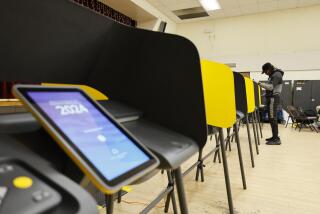Debunking two myths about politics and the 2020 presidential election
Beto O’Rourke’s announcement Thursday that he’s joined the Democratic scrum means the party’s field of presidential candidates is nearly set.
A few more candidates may yet join the race — Rep. Eric Swalwell keeps traveling to Iowa, Montana Gov. Steve Bullock says he’ll make a decision in the spring. But of the remaining possibilities, only former Vice President Joe Biden would have an immediate impact. Aides indicate his all-but-certain announcement will come in April.
With more than a dozen candidates in the race, now’s a good time to debunk a couple of persistent political myths. The first involves the dynamics of such a big, complicated field.
Sign up for the Essential Politics newsletter »
UNLEARNING THE LESSON OF 2016
In 2016, Donald Trump won the Republican nomination even though he failed to gain a majority of voters in most of the early primaries. Trump had the backing of an ardent base of supporters, his many rivals divvied up everyone else, and by the time only two opponents were left, he had an unstoppable lead.
The lesson some have drawn from that experience is that a candidate with a solidly committed following, Sen. Bernie Sanders, for example, could win the Democratic nomination in a crowded field by holding a consistent 35%-40% of the vote.
It doesn’t work that way.
Republicans allow winner-take-all primaries in their nominating contest, and that played a big role in Trump’s success. The rules allowed him to get the lion’s share of delegates without winning a majority of the vote.
In South Carolina’s primary, for example, Trump won just under a third of the vote and received all the state’s delegates. A couple of weeks later, he won all of Florida’s delegates with about 46% of the vote.
Democrats don’t allow that. Under Democratic rules, designed to open up the process and ensure that all factions of the party get representation, delegates get awarded roughly in proportion to a candidate’s vote.
In a multi-candidate field, those rules make winning an insurmountable delegate lead very difficult.
The problem Republicans had in 2016 was rules that gave the party no effective way to stop a candidate from taking the nomination with the support of an ardent minority.
In 2020, Democrats face the opposite problem — the rules may provide no way for any candidate to amass a delegate majority.
It’s possible, of course, that one candidate will sweep through the early primaries. Perhaps Biden will prove that all the early polls showing him in the lead have measured genuine support, not just name recognition. Perhaps Sanders will widen his support and take a majority. Maybe Sen. Kamala Harris, who has gained ground this winter, will continue a steady rise.
It’s also possible that Democrats could arrive at their convention in Milwaukee with multiple candidates still fighting for the prize and no clear victor.
THE MYTH OF THE INDEPENDENT VOTER
While we’re knocking down myths, the nonpartisan Pew Research Center has released polling data that, once again, disproves one of the most consistent false impressions in politics — the idea that the country has a huge and growing number of independent voters.
As Pew notes, the number of Americans who call themselves independent has grown steadily and now stands at 38% of the adult population. California mirrors that trend, with 28% of voters now registered as “no party preference.” Among 16- and 17-year-olds who have preregistered, 52% chose that no-party option.
Those numbers often get cited as evidence that voters want an option beyond the two major parties. That’s one of the main arguments for Howard Schultz’s possible independent presidential campaign.
Baloney.
As Pew’s numbers show, Americans may shun the party label, but the vast majority reliably vote a party line. Of the 38% of adults who call themselves independent, just under half, 17% of the population, lean Democratic, while a smaller share, 13% of adults, leans Republican.
Only 7% of Americans say they don’t lean either way. What most characterizes them? Lack of interest in politics: Those pure independents mostly don’t pay much attention to public debates, frequently don’t register to vote and are less likely to cast ballots, Pew found.
Those who do lean to one party or the other behave very much like their more openly declared partisans. That’s especially true on the Democratic side. Independents who lean Republican differ from Republican partisans on some issues — the independents are more likely to favor same-sex marriage, for example, and offer somewhat less support to Trump.
Overall, Democrats and independents who lean their way make up 48% of the population, Pew found. Republicans and Republican leaners make up 39%. Republicans, however, vote more consistently, which keeps U.S. elections close.
SETBACK IN THE SENATE
A dozen Republican senators joined the chamber’s 47 Democrats on Thursday in voting to overturn Trump’s declaration of a national emergency on the southern border.
Trump will veto the resolution, which already passed the House, and neither chamber has the votes to overturn the veto. But the Senate defections were nonetheless important, Jennifer Haberkorn writes.
The White House had tried hard to hold the line in the Senate, but Trump alienated several Republican senators and, once again, undercut administration negotiators by rejecting a deal they thought they had worked out on his behalf.
Whether Trump’s emergency declaration will ever lead to more construction of border barriers remains unknown. Look for litigation ahead.
THE GROWING DEMOCRATIC FIELD
Beto O’Rourke got wall-to-wall coverage Thursday for his announcement tour of Iowa. But as Evan Halper wrote, that just proved what we already know — O’Rourke knows how to generate publicity. Whether he can translate excitement into actual votes in a big Democratic field remains unknown.
Notably, although he ducked several issues, O’Rourke did clearly take a more moderate tack than many of his rivals. On the minimum wage, for example, he called for an increase to $15 an hour over the next six years — a much slower pace than other Democrats have advocated.
After a winter in which senators from the party’s left dominated the debate, a more moderate element has come to the fore this month, as Janet Hook wrote. That can be seen not only from O’Rourke, but also from the entry of some governors into the race.
That less ideological style will be further reinforced by Biden. As Hook wrote, he strongly hinted that he’s getting in during a speech to a friendly union audience this week.
If Biden does run, however, he bears the heavy burden of history, Doyle McManus wrote. Biden has taken a lot of positions over more than four decades in public life. A lot of them don’t square with where the Democratic party currently stands.
PELOSI PREVAILS AGAIN
House Speaker Nancy Pelosi made a splash earlier this week by telling an interviewer in public what she’s been privately telling people for weeks — she doesn’t favor the idea of impeaching Trump.
Impeachment would be too divisive for the country, unless the evidence is so compelling that Republicans would join in, Pelosi said.
Of course, that doesn’t mean the House should back off from aggressively investigating allegations of wrongdoing by Trump and his associates, Pelosi added.
Democrats may yet decide to try to impeach Trump, but now, if they do go that route, Pelosi’s highly publicized statement will allow them to say they were compelled by the evidence, rather than by a preexisting condition. And for now, as Haberkorn wrote, Democrats have once again fallen into line behind Pelosi. Even some of the most outspoken members on the left have backed off their impeachment talk.
Meantime, Trump’s former campaign chairman Paul Manafort took a double hit this week, as Chris Megerian wrote. A federal judge in Washington added several more years to his potential prison sentence, while New York state prosecutors indicted him.
The state charges, which parallel the bank fraud allegations on which Manafort was tried in federal court, could be vulnerable to legal attack on grounds of double jeopardy. But if they stand up, they could keep Manafort in prison even if Trump pardons him on his federal convictions; a presidential pardon can’t overturn a state sentence.
LUDDITE IN CHIEF?
Trump loves several perks of his job, but his favorite may be the audience it gives him to comment on practically anything. This week, he aired his views on modern airplanes, opining that some were “too complex to fly.” As Eli Stokols wrote, the comment once again showed the president’s odd aversion to technology.
JUDICIAL NOMINEE APOLOGIZES
After a couple of false starts, the administration has gotten serious about efforts to put more conservative judges on the 9th U.S. Circuit Court of Appeals, Trump’s least favorite court.
The current nominee, Kenneth Kiyul Lee, a conservative lawyer from Los Angeles, wrote a number of controversial opinion articles as an undergraduate, as Sarah Wire wrote. The articles include some attacking feminists and others that disparaged gay men. To make matters worse for the nominee, he failed to give the Senate Judiciary Committee some 75 articles; he says he had forgotten about them.
Lee apologized to the committee this week.
“I absolutely would not write that today. I truly regret writing that. Frankly, as an 18-year-old, I didn’t know anything,” he said.
RESTORING CONFIDENCE
Del Wilber writes that new Atty. Gen. William Barr has put a high priority on trying to restore confidence in the Justice Department after the rocky tenure of Jeff Sessions.
Barr will face a tough test of that effort in coming weeks when special counsel Robert S. Mueller III wraps up his investigation and submits a long-anticipated report. Despite repeated false alarms, the Mueller report does seem likely to come relatively soon.
Another Cabinet official remains under fire. Commerce Secretary Wilbur Ross continues to draw criticism for his decision to add a question about citizenship to the 2020 census, as Wire wrote.
A STORMY BREAKUP
Stephanie Clifford, the adult film actress who performs as Stormy Daniels and who alleges a sexual encounter with Trump, has split with her lawyer, Michael Avenatti, Michael Finnegan wrote.
Avenatti has had a rough week. In addition to the split with Daniels, Judge Catherine Bauer of U.S. Bankruptcy Court in Santa Ana rejected a bankruptcy petition from his former law firm and ordered Avenatti to testify about allegations from creditors that he had made the filing in bad faith.
DEBATE OVER ISRAEL
What’s the long-term impact of the furor over statements by Rep. Ilhan Omar that many saw as anti-Semitic? Some on the left hope that the controversy will at least open the way for a wider-ranging debate in Congress over Israel, Haberkorn writes. Others, however, fear that Omar’s comments will backfire and constrain debate even further.
EYES IN THE SKY
Spy satellites used to be the exclusive province of intelligence agencies, but these days, lots of people have access to cameras in space. For the Trump administration, that’s been a problem, David Cloud writes.
Administration officials have chafed at second-guessing of their North Korea policy, much of it driven by satellite images of North Korean missile sites.
CAMPAIGNS WITHOUT END
Ever wonder why U.S. campaigns last so long? David Shribman looked back at the history and says presidential marathons took root in 1968. Read why.
LOGISTICS
That wraps up this week. Until next time, keep track of all the developments in national politics and the Trump administration at our Politics page and on Twitter @latimespolitics.
Send your comments, suggestions and news tips to politics@latimes.com.
If you like this newsletter, tell your friends to sign up.
More to Read
Get the L.A. Times Politics newsletter
Deeply reported insights into legislation, politics and policy from Sacramento, Washington and beyond. In your inbox three times per week.
You may occasionally receive promotional content from the Los Angeles Times.







